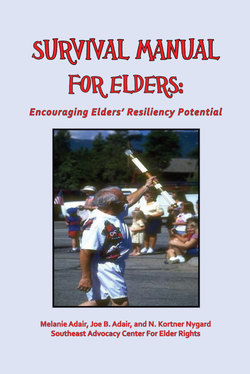Читать книгу Survival Manual for Elders: Encouraging Elders' Resiliency Potential - Melanie J.D. Adair - Страница 5
На сайте Литреса книга снята с продажи.
Elders Are Still the Same Person on the Inside!
ОглавлениеRegardless of their age, frailty, or cognitive impairment, older adults remain the same person inside. They simply may be unable to fully express who they are in the same ways that they used to do. We have to be paying attention.
There is a mistaken idea that when a person starts experiencing memory loss or confusion, the person they have previously been is gone. That simply is not true. They are still the same person you have known. They are simply having difficulty organizing their thoughts, expressing what they want, or remembering what they intended to do or say.
Have you ever taken a test in a difficult subject you didn’t really understand? Organizing your thoughts and trying to express yourself was a significant challenge. You probably felt at least a little sense of panic at the time. You realized you were having trouble. You couldn’t pull everything together. However, you were still YOU. You still cared. You just couldn’t figure it out. That experience is somewhat like the difficulty most people with dementia experience.
Have you ever found yourself temporarily disabled and discovered that your friends didn’t include you or you weren’t able to participate in the usual gatherings? When group activities were centered around physical activities such as hikes, big shopping outings, attending major sporting events, or going dancing, your friends didn’t invite you because it would be too hard for you to do, and you felt very left out. But, you were still YOU! They were still your friends. You simply couldn’t do what you were used to doing with them, and their lives went on without you. That is similar to the experience elders have when they become frail or infirm. They are still themselves on the inside. It is hurtful to them to be unable to engage in those things that in the past have offered both enjoyment and companionship.
Have you ever been part of a group gathering where people largely ignored you? Maybe they interacted with each other, but for some reason they almost acted as if you were part of the furniture. There was a part of you that may have wanted to cry out, “Hey, come talk to me. I’m here. I’m interesting. I’m of value.” That is the same feeling many elders experience as others talk about them as if they weren’t there, ignore them and simply do tasks around them, talk down to them using condescending language, or act as if dealing with them were too much trouble.
Elders do have value. They deserve to be treated as someone who matters. This includes enabling them to fully live out their lives in a setting that, as much as possible, mirrors a normal, independent life, even if there are some protective measures built into the environment. When elders are treated as if they continue to have something to contribute and their life continues to have meaning and purpose, they respond by staying more engaged with life. They are better able to retain social and verbal skills, and to problem solve when life presents challenges. When surrounded by people and circumstances that are encouraging their Resiliency Potential, elders are much more likely to continue to thrive.
